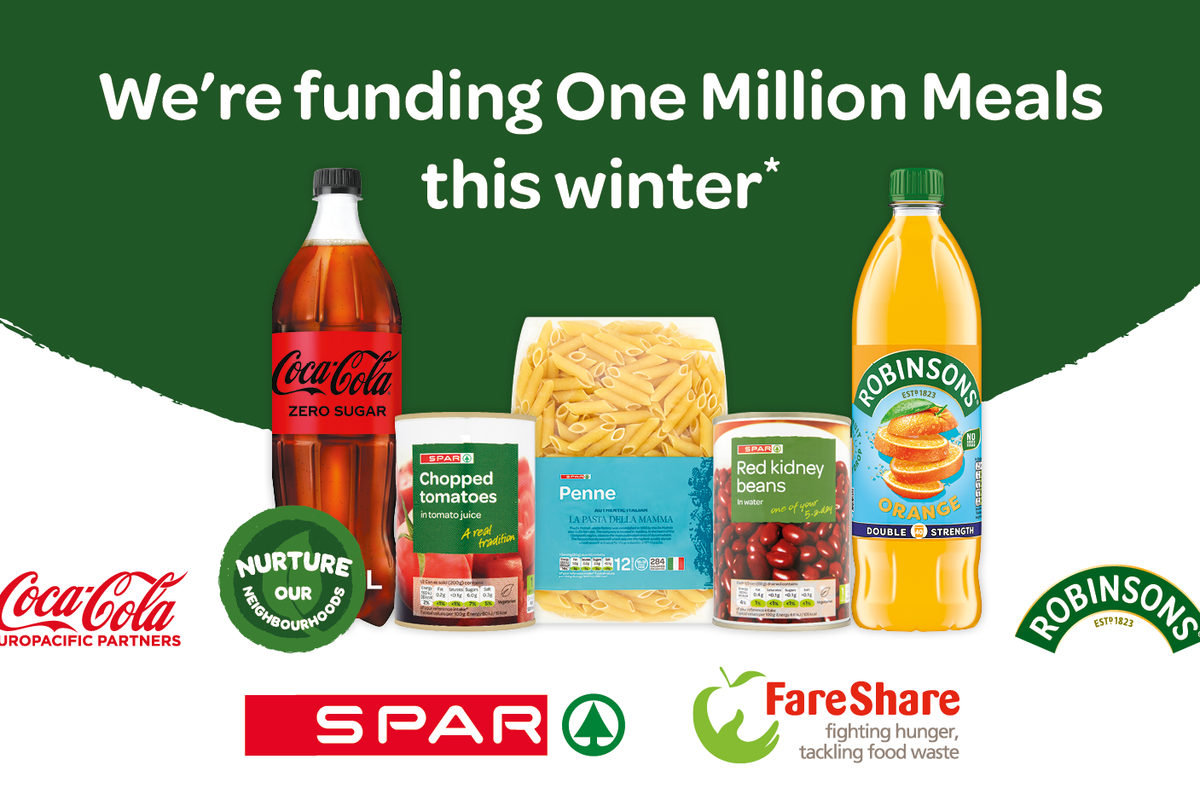SPAR is partnering with FareShare, the UK’s biggest charity fighting hunger and tackling food waste, to provide the equivalent of one million meals through local charities in cities, towns and villages across the UK, as part of the One Million Meals | SPAR project.
The campaign starts on 21 September and will run in SPAR stores around the UK until 1 November 2023.
FareShare is the UK’s longest running food redistribution charity who believe that no good food should go to waste, especially when people are going hungry. This belief is as central to their work now as it was 25 years ago. According to FareShare, seven million people in the UK are struggling to afford to eat. This represents 1 in 10 of the UK population.
“Our partnership with FareShare will see £250,000 donated, and for every £1 given FareShare can redistribute enough food for the equivalent of four meals to people in need across the UK," said Suzanne Dover, SPAR UK Brand & Marketing Director. "We believe in supporting the communities we serve, and this partnership means that people won’t have to go without the staples we all use each day.”
Britvic and Coca-Cola are proud to be part of SPAR’s first One Million Meals campaign, which will be supported with POS in-store to hero SPAR own label products store cupboard staples, Robinsons squash and Coke Zero.
There will also be content available across digital channels, with blog posts and TikTok content creators to really bring the campaign to life.
Polly Bianchi, director of fundraising at FareShare added: “The Giving One Million Meals donation from SPAR, with contributions from Coca-Cola and Robinsons, will make a significant contribution to our work getting good-to-eat food, which might otherwise go to waste, to people who need it.
“As the winter months approach, our network of 8,500 charities across the UK will be working hard to provide hearty, nourishing meals for people in their communities.
“Each group provides vital wraparound services to support people impacted by the cost of living crisis and the contribution made by SPAR will go a long way to strengthening those communities.”
A study of 2,000 adults was commissioned by SPAR to coincide with the launch of the Giving One Million Meals* project with FareShare. It has discovered how food essentials have changed over time, as well as attitudes towards food waste and helping others who may be experiencing food insecurity.
The new research has revealed that British cupboards are now home to food staples few would have even heard of in 1980 - like couscous, harissa and coconut milk.
Suzanne Dover added: “We understand how important it is to have the cupboard essentials you need to hand and it’s really interesting to see how our essentials have changed over the years and which are still our firm favourites.”
One in three homes now have a bottle of soy sauce available at all times, while 25 per cent consider balsamic vinegar an essential ingredient. A tenth of kitchens have rice crackers stocked but corned beef, condensed milk and SPAM are things people would find in their parent’s or grandparent’s cupboards only. Baked beans, biscuits and tinned soup are goods that have stood the test of time for over 40 years.
Other foodstuffs most Brits would only expect to find in an older person’s larder include tinned peaches (27 per cent), tinned sardines (21 per cent) and Bovril (21 per cent). But items that remain store cupboard staples include chopped tomatoes (50 per cent), tinned tuna (45 per cent) and lentils (22 per cent).
Almost a fifth (18 per cent) believe there are five to 10 items at the back of their cupboards which are long past their use by date. And 61 per cent even think they’ve got spices, tins or bags with foodstuffs that are up to four years old.
Exactly one in 10 people asked, say they can’t remember the last time they had a proper sort-out of their kitchen cupboards, as 52 per cent admit they worry about throwing away and wasting staple foodstuffs.
Just over eight in 10 (83 per cent) are likely to save cooked food and use them as leftovers, rather than throw them away. Of these, 79 per cent hate to see food wasted, and 51 per cent fret about how much more expensive food is now.
To bulk out their meals and make them go further, 48 per cent are adding more vegetables, and 32 per cent will include old leftovers into a new meal. Just under a fifth (19 per cent) will experiment with the items in their cupboards to enhance a meal they’re making and reduce waste.
When it comes to helping others half of us (49 per cent) have donated to food banks and charities to give back - with 19 per cent donating more to food bank in recent years to help with the cost-of-living crisis.
BRITS KITCHEN CUPBOARD STAPLES:
- Pasta
- Baked beans
- Rice
- Chopped tomatoes
- Olive oil
- Gravy
- Biscuits
- Tinned tuna
- Jams and marmalades
- Tinned soup
- Porridge oats
- Tomato puree
- Pasta sauces
- Soy sauce
- Honey
- Chocolate bars
- Tinned sweetcorn
- Kidney beans
- Chickpeas
- Balsamic Vinegar
Visit for more information, visit https://www.spar.co.uk/community/one-million-meals/
Research conducted by One Poll with 2000 UK adults in September 2023.
*SPAR UK will donate £250, 000 to FareShare, with contributions from Coca-Cola and Robinsons, enabling the charity to provide the equivalent of 1 million meals to communities. According to WRAP guidelines a meal is 420g and FareShare can redistribute the equivalent of one meal for every 25p donated. For more information visit https://www.spar.co.uk/community/one-million-meals/


